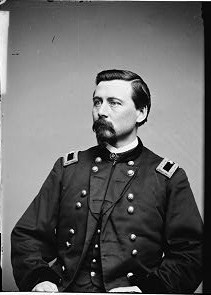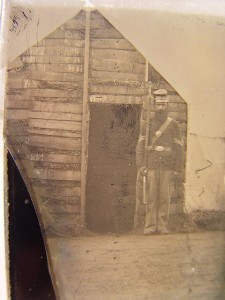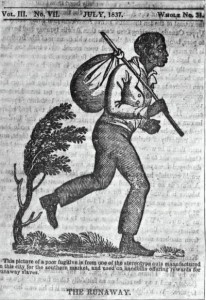Even Democrats Want to Leave Fugitive Slaves Alone
From The New-York Times November 30, 1861:
Slave-Catching in the Army.
MARYLAND, Sunday, Nov. 22, 1861.
To the Editor of the New-York Times:
The following document was read at our evening regimental dress parade to-night. It was received from the headquarters of LANDER’s Brigade, Col. E.W. HINKS commanding, and was read aloud, to afford the “two persons” therein described an opportunity to come forward and deliver themselves up. I may say, however, that, if they were in camp, they cannot now be found. It is feared that the publicity of the notice may have prevented its execution; an unfortunate effect, if true, and one, of course, not anticipated. I give the contents verbatim:
BRIGADE HEADQUARTERS,
CAMP BENTON, Nov. 22, 1861.
Col. Ira R. Grosvenor, Commanding Seventh Michigan Volunteers:
COLONEL: You will cause search to be made in your camp for two persons held to servitude by the laws of Maryland, answering to the following descriptions:
First — Bright mulatto boy, 22 or 23 years old, 5 feet 9 or 10 inches high; had on when left a pair of heavy new boots; cast-down countenance when looked at name CHARLEI.
Second — Black boy, quite black, 21 or 23 years old about 6 feet high; had on shoes, and has unusually large feet; also, a small scar on face; name JACOB or JAKE. I am, respectfully,
Your obedient servant,
J.A. CHADWICK, A.A.A.G.
It is doubted whether our superior officers ever heard of the resolution of the last Congress declaring it to be no part of the duty of the army to catch and return fugitive slaves; and certain I am that those “persons held to servitude under the laws of Maryland” would nowhere have been safer than in the camp of the Seventh Michigan immediately after hearing the above document. The field officers of the Seventh were in former times Democrats, and one of them remarked in my hearing that “he was getting to be too much of an Abolitionist to catch niggers for any man.” He made it a little stronger than this, but the oath was so worthily sworn that it can never be rigidy regarded against him. This, coming as it did from one who in times past has been a Democrat of the sternest sect, but who was ever a high-minded man is a true exponent of the sentiment everywhere expressed this evening. Nor do I believe that either of the other field officers would be one whit more eager in such a search than the one I have spoken of. The Seventh has never sought to interfere in any way with the “institution,” nor will it do so. But the slaveowners must catch their own negroes, for we never shall do it for them.
At this time (9 P.M.) it is ascertained that neither of the aforesaid persons have ever been in our camp, and there is now, if any thing, rather a feeling of disappointment that they were not here.
Let me ask you, Messrs. Editors, to ventilate a little this subject, and give us to understand if this is the purpose for which we were enlisted. I cannot believe that such regulations can have the sanction of our Government, and that it is a false policy is, I think, very clear. These questions, however, you can discuss with much more ability than I.
I have but given you the facts, which are of record, and can easily be verified on occasion.
They seem to furnish their own comment.
Yours, SOLDIER.
According to Antietam on the Web E.W. Hinks was wounded at the Battle of Antietam but still served the remainder of the war. He “commanded the 3rd Divisionn/XVIII Corps (US Colored Troops) at Petersburg.”
Find A Grave has more information about Ira Rufus Grosvenor.



